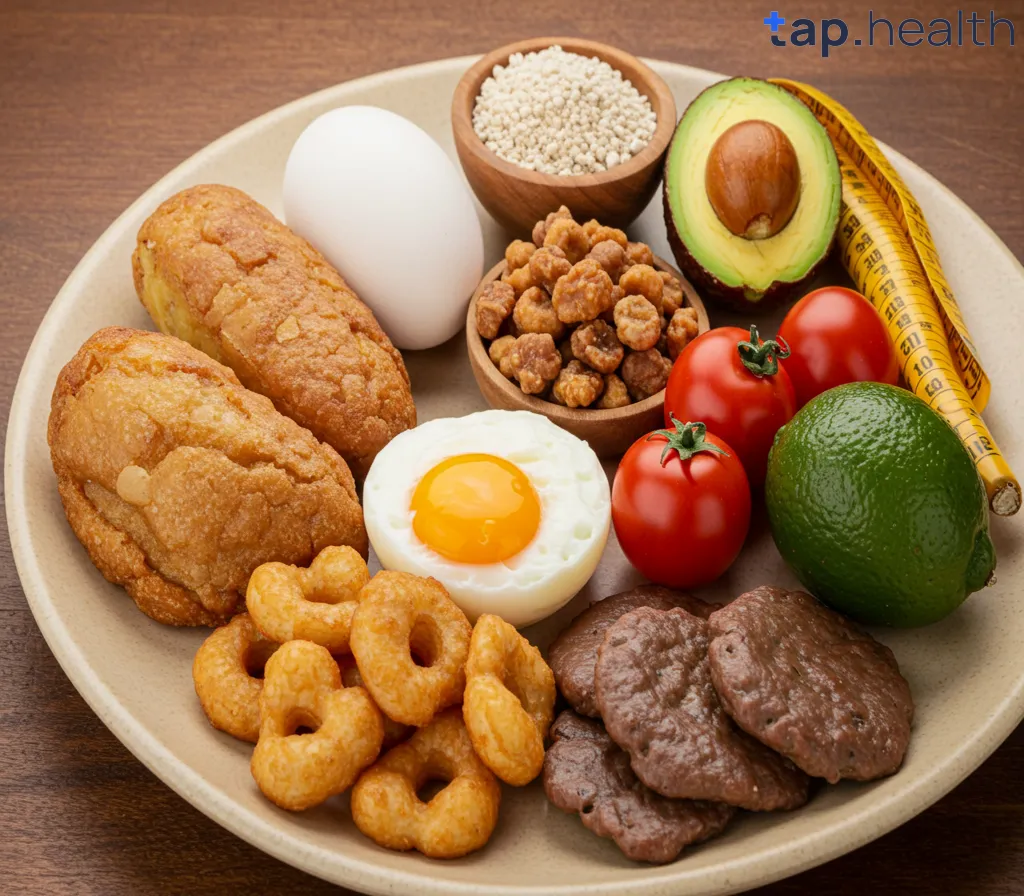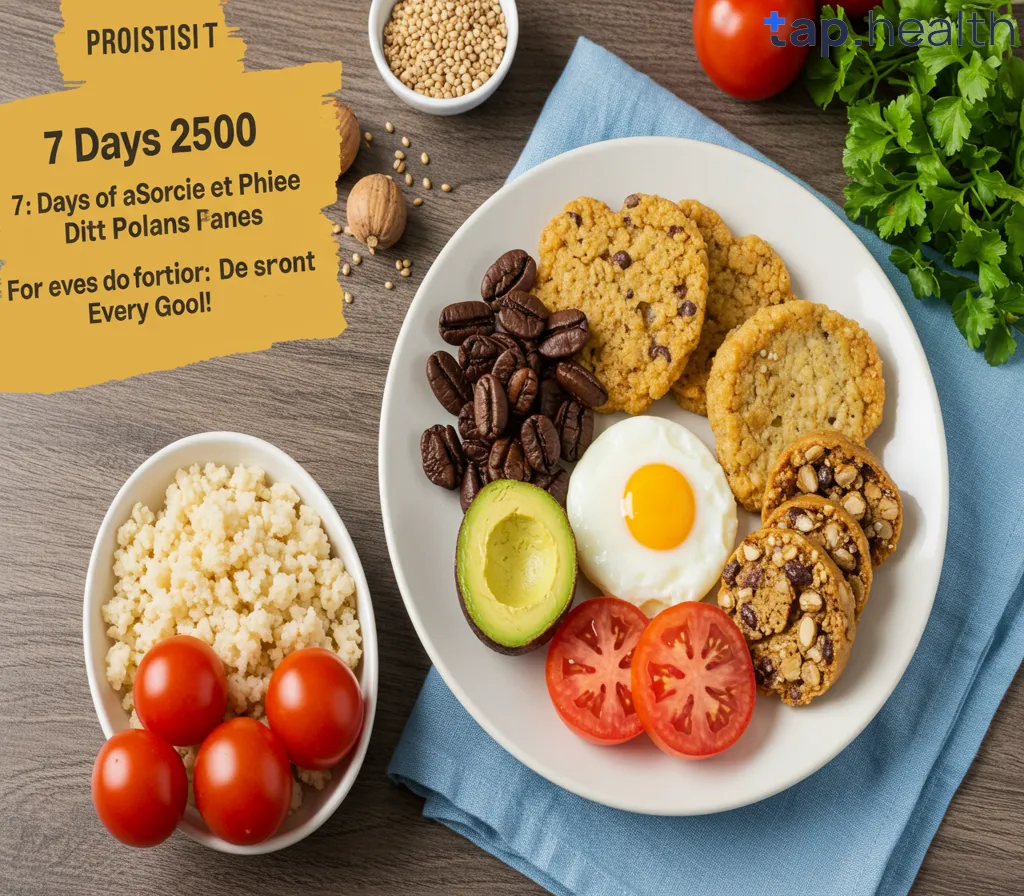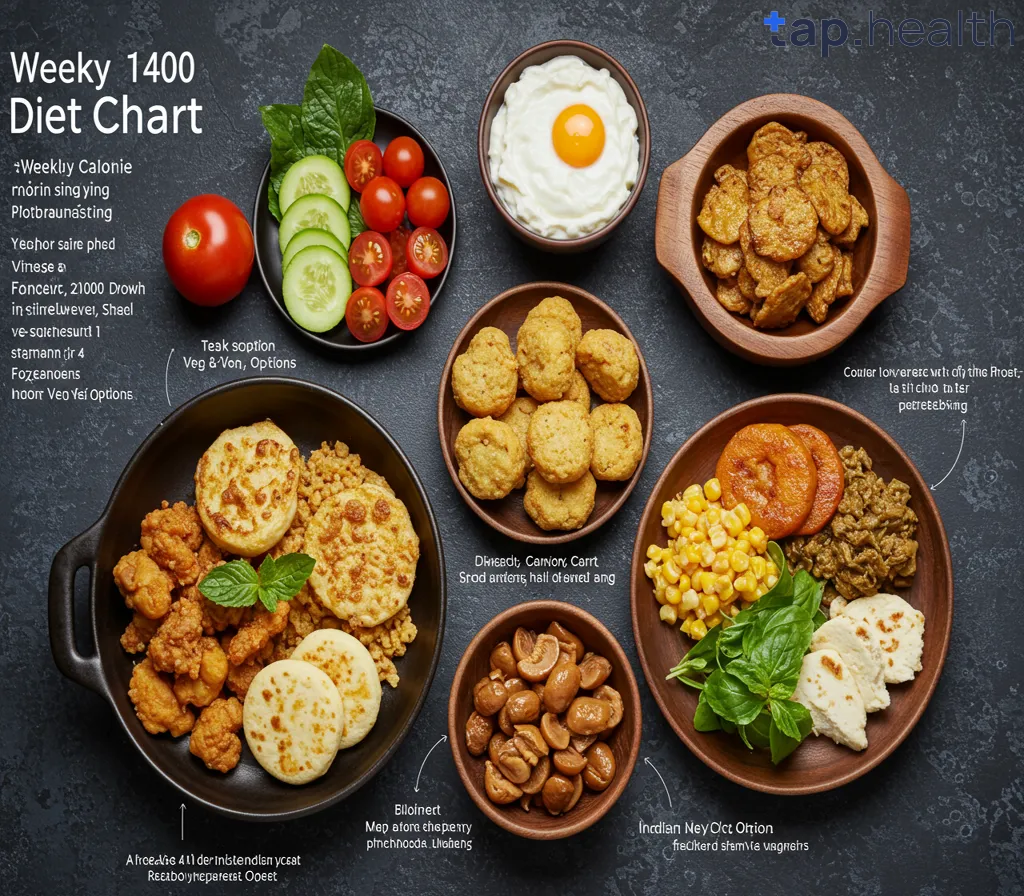When embarking on a weight loss journey, choosing the right diet plan can be crucial for success. For beginners, an 1100-calorie diet plan offers a moderate caloric restriction that encourages healthy fat loss while still providing the body with essential nutrients. This balanced approach to weight loss is effective for those looking to shed extra pounds without compromising energy levels or nutrient intake.
In this detailed guide, we will explore the 1100-calorie diet plan, how it works, its benefits, and provide a comprehensive meal plan specifically tailored for Indian foods. We’ll also address all common questions people ask when starting such a diet.
What is an 1100-Calorie Diet Plan?
An 1100-calorie diet plan is a calorie-restricted eating strategy where the total daily intake is limited to 1100 calories. For most adults, the average daily calorie needs range from 1,800 to 2,500 calories, depending on factors such as age, gender, and physical activity levels. By consuming fewer calories, the body enters a caloric deficit, prompting it to use stored fat for energy, leading to fat loss.
A 1100-calorie diet is a moderate approach to weight loss. It offers enough nutrition to sustain energy and body function, unlike more extreme diets (like 500 or 800-calorie plans) that might lead to nutrient deficiencies and muscle loss.
In an Indian context, this diet is customized to include traditional foods that are both nutrient-dense and calorie-efficient. The goal is to create a balanced diet that allows for effective weight loss while providing necessary vitamins, minerals, and macronutrients.
How Does the 1100-Calorie Diet Work?
The 1100-calorie diet works based on the principle of caloric deficit, which is the most effective way to lose weight. The process works as follows:
1. Creating a Caloric Deficit:
When you consume fewer calories than your body requires, your body turns to stored energy (mainly fat) to fuel daily functions. This leads to fat loss over time, especially when the calorie deficit is consistent.
2. Fat Burning vs. Muscle Loss:
Since 1100 calories is still above the starvation level (as seen with extremely low-calorie diets), the body will primarily use fat stores for energy, rather than muscle tissue. However, without adequate protein intake, muscle loss can still occur. Therefore, ensuring adequate protein and engaging in strength training exercises are essential for preserving lean muscle mass.
3. Maintaining Energy Levels:
With the right balance of nutrients—carbohydrates, protein, and healthy fats—an 1100-calorie diet can provide enough energy for daily activities, exercise, and normal bodily functions. The inclusion of fiber-rich foods, like vegetables and legumes, helps maintain satiety and prevent hunger pangs.
Why Choose an 1100-Calorie Diet for Weight Loss?
The 1100-calorie diet offers a balanced approach to weight loss, providing a moderate caloric deficit that can help individuals achieve gradual fat loss while maintaining their health. Here’s why it is an excellent option for those looking to shed pounds:
1. Gradual and Sustainable Weight Loss
An 1100-calorie diet offers a healthy weight loss rate of approximately 0.5 to 1 kg per week, which is considered sustainable and less likely to result in rebound weight gain. Rapid weight loss can often lead to muscle loss, nutritional deficiencies, and a slower metabolism.
2. Balanced Nutritional Intake
Unlike extremely restrictive diets, the 1100-calorie Indian diet ensures you still get a well-rounded intake of essential nutrients. This is achieved through a focus on whole foods like vegetables, legumes, whole grains, lean proteins, and healthy fats, which prevent nutrient deficiencies.
3. Supports Healthy Digestion
This diet emphasizes fiber-rich foods such as vegetables, fruits, and legumes. Fiber helps regulate digestion, prevent constipation, and promote overall gut health, which are important factors when losing weight.
4. Improved Metabolism
By including a balanced mix of protein, carbs, and healthy fats, an 1100-calorie diet can help support a healthy metabolism. Protein helps build lean muscle mass, and consuming adequate fats supports hormonal balance and energy levels.
How to Create an Effective 1100-Calorie Indian Diet Plan
An Indian diet plan for 1100 calories should be nutrient-dense and incorporate traditional, familiar foods. The focus should be on low-calorie, high-nutrient foods that are rich in fiber, protein, and micronutrients like vitamins and minerals.
Key Components of a Healthy 1100-Calorie Indian Diet:
- Protein: Include legumes (like lentils, chickpeas), tofu, paneer, and low-fat dairy.
- Healthy Fats: Use olive oil, ghee, nuts (like almonds), and seeds for healthy fats.
- Whole Grains: Incorporate whole wheat roti, brown rice, quinoa, and millets for fiber and slow-releasing energy.
- Vegetables: Load up on leafy greens, cauliflower, spinach, tomatoes, bell peppers, and other colorful vegetables to maximize fiber and nutrients while keeping the calories low.
Detailed 1100-Calorie Indian Diet Plan
Here’s a detailed 1100-calorie Indian diet plan that ensures nutrient balance, protein intake, and sustainable weight loss. This plan includes traditional Indian foods, making it easy to stick to and enjoyable.
Day 1 – 1100-Calorie Indian Meal Plan
Breakfast (250 Calories):
- 1 boiled egg (70 calories)
- 1 small apple (80 calories)
- 5 almonds (50 calories)
- 1 cup green tea (5 calories)
- 1 teaspoon ghee (45 calories)
Lunch (400 Calories):
- 1 small bowl of moong dal (100 calories)
- 1 small whole wheat roti (80 calories)
- 1 small cucumber salad with lemon juice (50 calories)
- 1 small cup of low-fat yogurt (80 calories)
- 1 teaspoon olive oil for dressing (40 calories)
Dinner (400 Calories):
- 1 small serving of vegetable stir-fry (spinach, cauliflower, peas) (150 calories)
- 1 small portion of grilled paneer (150 calories)
- 1 small portion of quinoa or brown rice (100 calories)
Day 2 – 1100-Calorie Indian Meal Plan
Breakfast (250 Calories):
- 1 small banana (90 calories)
- 1 tablespoon peanut butter (90 calories)
- 1 cup herbal tea (5 calories)
- 5 almonds (50 calories)
Lunch (400 Calories):
- 1 small serving of chana masala (150 calories)
- 1 small whole wheat roti (80 calories)
- 1 small side of mixed greens salad (50 calories)
- 1 small cup of low-fat yogurt (80 calories)
Dinner (400 Calories):
- 1 small bowl of dal soup (spinach, onions, and garlic) (150 calories)
- 1 small portion of grilled tofu (150 calories)
- 1/2 cup steamed broccoli (50 calories)
- 1 small cup of yogurt (50 calories)
Day 3 – 1100-Calorie Indian Meal Plan
Breakfast (250 Calories):
- 1 boiled egg (70 calories)
- 1 small apple (80 calories)
- 1 cup green tea (5 calories)
- 5 almonds (50 calories)
- 1 small portion of chia seeds (45 calories)
Lunch (400 Calories):
- 1 small bowl of dal soup (150 calories)
- 1 small portion of brown rice (100 calories)
- 1 small side of mixed vegetables (50 calories)
- 1 teaspoon olive oil for dressing (40 calories)
Dinner (400 Calories):
- 1 small serving of vegetable stir-fry (spinach, zucchini, bell peppers) (150 calories)
- 1 small portion of grilled paneer (150 calories)
- 1 small portion of quinoa (100 calories)
Frequently Asked Questions (FAQs) on 1100 Calorie Indian Diet Plan for Healthy Weight Loss – Sustainable & Effective
1. How Much Weight Can I Lose on an 1100-Calorie Diet?
On an 1100-calorie diet, weight loss will vary based on factors like age, activity level, and metabolism. Typically, you can expect to lose about 0.5-1 kg per week with consistent adherence to the plan.
2. Can I Follow the 1100-Calorie Diet Long-Term?
It is not recommended to follow an 1100-calorie diet for long periods. This diet is suitable for short-term weight loss goals (2-4 weeks). Long-term, sustainable weight loss should involve a more balanced approach that supports metabolism and overall health.
3. Can I Exercise on a 1100-Calorie Diet?
Yes, light to moderate exercise, such as walking, yoga, or strength training, can be performed on a 1100-calorie diet. Intense workouts may be difficult initially due to limited energy intake.
4. Is the 1100-Calorie Indian Diet Safe for Women?
The 1100-calorie Indian diet is generally safe for women when followed for a short duration. However, it’s important to ensure the diet is nutritionally balanced to avoid deficiencies and to maintain muscle mass. Always consult a healthcare provider before beginning a calorie-restricted diet.
5. How Do I Maintain Weight Loss After an 1100-Calorie Diet?
To maintain weight loss, gradually increase your calorie intake while continuing to focus on nutrient-dense foods. Regular exercise and portion control will help you sustain the results long-term.
Conclusion
The 1100-calorie Indian diet plan is an ideal option for those looking for healthy weight loss that is both sustainable and nutrient-rich. By incorporating a variety of traditional Indian foods, this diet plan promotes fat loss while ensuring the body gets the necessary nutrients for overall health. Remember to consult with a healthcare provider before starting any diet plan, and focus on long-term sustainable habits to maintain a healthy weight.



